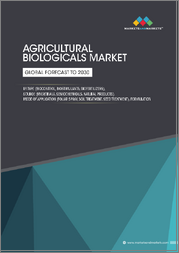
|
시장보고서
상품코드
1752362
바이오 비료 시장 수요 및 예측 분석(2018-2034년)Global Bio-Fertilizers Market Demand & Forecast Analysis, 2018-2034 |
||||||
바이오 비료 수요 분석
바이오 비료의 종류 중 콩과 식물과 공생관계를 맺어 대기 중의 질소를 고정시켜 식물이 이용할 수 있도록 하는 능력을 가진 뿌리혹박테리아가 가장 널리 사용되는 바이오 비료 중 하나로 각광받고 있습니다. 아조토박터와 아조스피리람은 자유생활성 질소 고정 박테리아로 콩과식물 외에도 다양한 작물에 도움을 주고 있습니다. 논에 많이 쓰이는 남조류는 질소와 유기물로 토양을 풍요롭게 합니다. 균근균은 식물의 뿌리와 공생관계를 맺어 영양분과 물의 흡수를 촉진합니다. 이처럼 다양한 종류의 바이오 비료를 사용할 수 있기 때문에 농부들은 각자의 농업적 필요와 토양 조건에 가장 적합한 바이오 비료를 선택할 수 있습니다.
바이오 비료는 밭작물, 과일 및 채소, 특수작물, 잔디 등 다양한 작물 카테고리에서 널리 사용되고 있습니다. 밀, 옥수수, 쌀과 같은 밭작물은 대규모 농장에서 수확량과 토양 건강성을 높이기 위해 바이오 비료 사용의 큰 비중을 차지합니다. 과일 및 채소 부문도 바이오 비료의 혜택을 받고 있으며, 바이오 비료가 영양분 흡수와 내병성을 향상시켜 농산물의 품질 향상에 기여하고 있습니다. 꽃, 향신료, 약용식물 등 특수 작물에서는 제품의 순도를 손상시키지 않고 토양의 비옥도를 유지하는 바이오 비료에 대한 의존도가 높아지고 있습니다. 조경 및 골프장 잔디밭에 적용하는 것도 성장하고 있는 분야 중 하나이며, 바이오 비료는 화학제품 투입을 줄이면서 푸른 잔디밭을 유지하는 데 도움을 주고 있습니다.
지역 시장 인사이트
지리적으로 아시아태평양은 광활한 농업 기반과 지속가능한 농법 채택이 확대됨에 따라 바이오 비료 시장을 주도하고 있습니다. 인도와 중국과 같은 국가들은 유기농 및 친환경 농업을 장려하는 정부의 노력으로 시장을 선도하고 있습니다. 이 지역은 또한 토양 미생물 활동을 지원하고 바이오 비료의 성능을 향상시키는 좋은 기후 조건의 혜택을 누리고 있습니다.
북미와 유럽은 유기농 식품 소비 증가와 엄격한 환경 규제로 인해 꾸준한 성장세를 보이고 있습니다. 이들 지역에는 새로운 바이오 비료 제품의 혁신과 상용화에 기여하는 첨단 연구 개발 시설도 있습니다. 라틴아메리카, 아프리카, 중동은 인지도와 인프라 지원의 증가로 인해 큰 잠재력을 가진 신흥 시장으로 부상하고 있습니다.
주요 시장 기업
바이오 비료 산업은 경쟁이 치열하고 다양한 제품을 제공하는 여러 기존 기업으로 구성되어 있습니다. 이 분야의 주목할 만한 기업으로는 Novozymes, National Fertilizers Limited, Madras Fertilizers Limited, Gujarat State Fertilizers & Chemicals, Rizobacter Argentina 등이 있습니다. 이들 기업은 다양한 작물과 기후 조건에 맞는 고품질의 효율적인 바이오 비료를 개발하기 위해 연구에 투자하고 있습니다. 각 회사의 활동에는 제품 제형 개선, 생산능력 확대, 더 넓은 고객층을 확보하기 위한 유통망 강화 등이 포함됩니다.
바이오 비료 시장 촉진요인
여러 요인이 바이오 비료 시장을 발전시키고 있습니다. 화학 비료의 환경 피해에 대한 농부들의 인식이 높아지면서 보다 지속가능한 대체 비료로의 전환을 촉진하고 있습니다. 세계 각국 정부는 바이오 비료 사용에 대한 보조금과 인센티브를 제공함으로써 유기농법을 장려하고 있으며, 이는 시장 성장을 촉진하고 있습니다. 또한, 세계 인구의 증가로 인해 농업 시스템은 토양의 건강성과 환경의 지속가능성을 유지하면서 작물 수확량을 증가시켜야 하는 과제를 안고 있습니다. 바이오 비료는 작물의 생산성을 자연적으로 향상시킴으로써 이러한 과제에 대한 해결책을 제공합니다.
또 다른 중요한 촉진요인은 유기농 식품에 대한 수요 증가입니다. 소비자들은 점점 더 건강과 환경 문제를 우선순위에 두고 있으며, 농부들과 식품 제조업체들이 친환경 농법을 채택하도록 촉구하고 있습니다. 이러한 소비자 주도의 수요는 농업 생산에서 바이오 비료의 사용을 더욱 촉진하고 있습니다. 또한, 지속적인 연구와 기술 혁신으로 특정 작물에 더 효율적인 바이오 비료가 개발되어 그 효과와 채택률이 증가하고 있습니다.
세계의 바이오 비료 시장에 대해 조사 분석했으며, 시장 역학 및 산업 동향, 각 부문별 수요, 제조업체 프로파일 등의 정보를 전해드립니다.
목차
제1장 소개
제2장 시장 요약
- 시장의 진화
- 수요 개요
- 산업 구조
- 전략상 문제
- 최종 용도 동향
- 성장 예측
제3장 경제와 에너지 전망
- GDP와 인구통계
- 금융 정책과 재정 정책
- 원유 생산과 가격
- 천연가스
- 전기요금
제4장 최종 용도 부문 실적
- 농업
- 기타
제5장 바이오 비료 소개와 시장 개요
- 제품 설명
- 등급과 특성
- 원재료
- 제조 공정
- 환경 문제
- 밸류체인
- 용도
제6장 시장 역학과 산업 동향
- 시장 역학
- 성장 촉진요인
- 성장 억제요인
- 기회
- 과제
제7장 세계의 바이오 비료 수요 분석 : 유형별, 용도별(수량과 금액)(2018-2034년)
- 전략상 문제와 COVID-19의 영향
- 수요 분석과 예측(2018-2034년)
- 수요
- 수요 성장률
- 성장 촉진요인 분석
- 세계의 바이오 비료 시장 : 유형별
- 근류균
- 아조토박터
- 아조스피릴룸
- 남조
- 균근균
- 기타
- 세계의 바이오 비료 시장 : 용도별
- 밭작물
- 과일·채소
- 특수 작물
- 잔디
- 기타
제8장 수요 분석과 시장 리뷰 : 지역/국가별(수량과 금액)(2018-2034년)
- 전략상 문제와 COVID-19의 영향
- 수요 분석과 예측(2018-2034년)
- 수요
- 수요 성장률
- 바이오 비료 시장 : 유형별
- 바이오 비료 시장 : 용도별
- 북미
- 미국
- 캐나다
- 멕시코
- 서유럽
- 독일
- 프랑스
- 이탈리아
- 영국
- 스페인
- 기타 서유럽
- 중유럽 및 동유럽
- 러시아
- 폴란드
- 기타 중유럽 및 동유럽
- 아시아태평양
- 중국
- 일본
- 인도
- 한국
- 기타 아시아태평양
- 중남미
- 중동 및 아프리카
제9장 가격 분석
제10장 주요 전략상 문제와 사업 기회 평가
- 시장 매력 평가
- 전망과 표적 시장 조사
제11장 전략적 추천과 제안
제12장 기업 분석
- 바이오 비료 제조업체 개요/기업 분석
- 기본 상세
- 본사, 주요 시장
- 소유
- 기업 재무
- 제조 거점
- 세계의 판매량
- 총 직원수
- 제품 포트폴리오/서비스/솔루션
- 채용된 주요 사업 전략과 Prismane Consulting 개요
- 최근 발전
- 대상 기업
- Novozymes
- National Fertilizers Limited
- Madras Fertilizers Limited
- Gujarat State Fertilizers & Chemicals
- Rizobacter Argentina
- 기타 제조업체
제13장 부록
ksm 25.07.01The global bio-fertilizers market has been steadily gaining traction as farmers and agricultural industries shift toward more sustainable and eco-friendly farming practices. Bio-fertilizers are natural substances containing living microorganisms that enhance soil fertility and promote healthy plant growth by increasing the availability of essential nutrients. Unlike chemical fertilizers, bio-fertilizers improve soil health over time without causing pollution or damaging the environment. This growing preference for sustainable agriculture is projected to drive the bio-fertilizers demand in the forecast period.
Bio-fertilizers come in various types, each playing a unique role in enhancing soil and plant health. Common types include Rhizobium, Azotobacter, Azospirillum, Blue Green Algae, Mycorrhizal Fungi, and other beneficial microbes. Each of these microbes has a distinct function, from nitrogen fixation to phosphate solubilization, helping crops absorb nutrients more efficiently. This diversity in bio-fertilizer types allows them to be tailored to specific crops, soils, and climates, which adds to their effectiveness and appeal among farmers.
Bio-fertilizers demand analysis
Among the types, Rhizobium stands out as one of the most widely used bio-fertilizers due to its ability to form a symbiotic relationship with leguminous plants, fixing atmospheric nitrogen and making it accessible to plants. Azotobacter and Azospirillum are free-living nitrogen-fixing bacteria that benefit a wide variety of crops beyond legumes. Blue Green Algae, often used in paddy fields, enriches the soil with nitrogen and organic matter. Mycorrhizal fungi form symbiotic associations with plant roots, enhancing nutrient and water absorption. The availability of these varied types enables farmers to select bio-fertilizers that best fit their agricultural needs and soil conditions.
Bio-fertilizers are widely used across different crop categories, including field crops, fruit and vegetable crops, specialty crops, turf, and others. Field crops such as wheat, maize, and rice represent a significant share of bio-fertilizer usage, driven by the need to enhance yields and soil health on large-scale farms. The fruit and vegetable sector also benefits from bio-fertilizers, which improve nutrient uptake and disease resistance, leading to better quality produce. Specialty crops, including flowers, spices, and medicinal plants, increasingly rely on bio-fertilizers to maintain soil fertility without compromising product purity. Turf applications in landscaping and golf courses are another growing area, where bio-fertilizers help maintain lush green grass with reduced chemical inputs.
Regional Insights
Geographically, Asia-Pacific dominates the bio-fertilizers market due to the region's vast agricultural base and growing adoption of sustainable farming practices. Countries such as India and China are leading markets, driven by government initiatives to promote organic and eco-friendly farming. The region also benefits from favorable climatic conditions that support microbial activity in soils, enhancing bio-fertilizer performance.
North America and Europe are witnessing steady growth fueled by increasing organic food consumption and stringent environmental regulations. These regions are also home to advanced research and development facilities that contribute to the innovation and commercialization of new bio-fertilizer products. Latin America, Africa, and the Middle East present emerging markets with significant potential, as awareness and infrastructural support improve.
Key Market Players
The bio-fertilizers industry is competitive and comprises several established players who offer a wide range of products. Some of the notable companies in this space include Novozymes, National Fertilizers Limited, Madras Fertilizers Limited, Gujarat State Fertilizers & Chemicals, and Rizobacter Argentina. These companies are investing in research to develop high-quality, efficient bio-fertilizers tailored to various crops and climatic conditions. Their efforts include improving product formulations, expanding production capacities, and enhancing distribution networks to reach a broader customer base.
Bio-fertilizers Market Drivers
Several factors are propelling the bio-fertilizers market forward. The increasing awareness among farmers about the environmental hazards of chemical fertilizers has encouraged a shift toward more sustainable alternatives. Governments worldwide are promoting organic farming practices by offering subsidies and incentives for bio-fertilizer usage, which has boosted market growth. Additionally, the rising global population has put pressure on agricultural systems to increase crop yields while maintaining soil health and environmental sustainability. Bio-fertilizers offer a solution to this challenge by improving crop productivity naturally.
Another important driver is the growing demand for organic food products. Consumers are increasingly prioritizing health and environmental concerns, pushing farmers and food producers to adopt eco-friendly practices. This consumer-driven demand further encourages the use of bio-fertilizers in agricultural production. Moreover, ongoing research and innovation have led to the development of more efficient and crop-specific bio-fertilizers, increasing their effectiveness and adoption rates.
Table of Contents
1. Introduction
- Scope
- Market Coverage
- Type
- Application
- Regions
- Countries
- Years Considered
- Historical - 2018 - 2023
- Base - 2024
- Forecast Period - 2025 - 2034
- Research Methodology
- Approach
- Research Methodology
- Prismane Consulting Market Models
- Assumptions & Limitations
- Abbreviations & Definitions
- Conversion Factors
- Data Sources
2. Market Synopsis
- Market Evolution
- Demand Overview
- Industry Structure
- Strategic Issues
- End-use Trends
- Growth Forecast
3. Economic & Energy Outlook
- GDP and Demographics
- Monetary & Fiscal Policies
- Crude Oil Production and prices
- Natural Gas
- Electricity Prices
4. End-use Sector Performance
- Agriculture
- Others
5. Introduction to Bio-Fertilizers and Market Overview
- Product Description
- Grades & Properties
- Raw Material
- Manufacturing Process
- Environmental Issues
- Value Chain
- Applications
6. Market Dynamics and Industry Trends
- Market Dynamics
- Drivers
- Restraints
- Opportunities
- Challenges
7. Global Bio-Fertilizers Demand Analysis, By Type, By Application (Volume, Value) (2018 - 2034)
- Strategic Issues and COVID-19 Impact
- Demand Analysis and Forecast (2018 - 2034)
- Demand
- Demand Growth Rate (%)
- Driving Force Analysis
- Global Bio-Fertilizers Market, By Type
- Rhizobium
- Azotobacter
- Azospirilium
- Blue Green Algae
- Mycorrhizal Fungi
- Others
- Global Bio-Fertilizers Market, By Application
- Field Crops
- Fruit & Vegetable Crops
- Specialty Crops
- Turf
- Others
8. Demand Analysis and Market Review, By Region, By Country (Volume, Value), (2018-2034)
- Strategic Issues and COVID-19 Impact
- Demand Analysis and Forecast (2018 - 2034)
- Demand
- Demand Growth Rate (%)
- Bio-Fertilizers Market, By Type
- Bio-Fertilizers Market, By Application
Note: Demand Analysis has been provided for all major Regions / Countries as mentioned below. The demand (consumption) split by type and application has been provided for each of the countries / regions in Volume (Kilo tons) and Value (USD Million).
- North America
- USA
- Canada
- Mexico
- Western Europe
- Germany
- France
- Italy
- United Kingdom
- Spain
- Rest of Western Europe
- Central & Eastern Europe
- Russia
- Poland
- Rest of Central & Eastern Europe
- Asia-Pacific
- China
- Japan
- India
- South Korea
- Rest of Asia-Pacific
- Central & South America
- Middle East & Africa
Note: CAGR will be calculated for all type and applications to arrive at the regional / global demand growth for the forecast period (2025 - 2034)
9. Pricing Analysis
10. Key Strategic Issues and Business Opportunity Assessment
- Market Attractiveness Assessment
- Prospective & Target Market Study
11. Strategic Recommendation & Suggestions
12. Company Analysis
- Bio-Fertilizers Manufacturers Profiles/ Company Analysis
- Basic Details
- Headquarter, Key Markets
- Ownership
- Company Financial
- Manufacturing Bases
- Global Turnover
- Total Employee
- Product Portfolio / Services / Solutions
- Key Business Strategies adopted and Prismane Consulting Overview
- Recent Developments
- Companies Covered -
- Novozymes
- National Fertilizers Limited
- Madras Fertilizers Limited
- Gujarat State Fertilizers & Chemicals
- Rizobacter Argentina
- Other Manufacturers
Note: This section includes company information, company financials, manufacturing bases and operating regions. Company financials have been mentioned only for those companies where financials were available in SEC Filings, annual reports, or company websites. All the reported financials in this report are in U.S. Dollars. Financials reported in other currencies have been converted using average currency conversion rates. Company profiles may include manufacturers, suppliers, and distributors.
13. Appendices
- Demand - Regions
- Demand - Countries



















